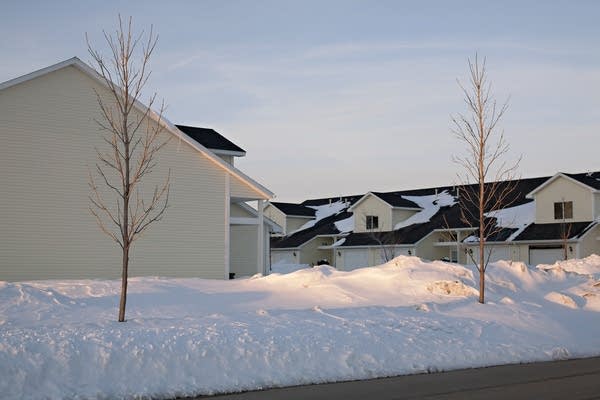Housing lack adds to difficulty finding workers

Sometimes when companies have difficulty filling jobs, it's not only because workers with the right skills are hard to find. It's because workers can't find housing.
That has emerged as a problem here in northwestern Minnesota, where Polaris Industries, Roseau's largest employer, wants to expand.
The snowmobile- and all-terrain-vehicle manufacturer has added more than 200 jobs in the past two years and employs more than 1,600.
"If I could get 75 people tomorrow, I'd take them," said Brian Gunnell, human resources manager. "So it's a pretty significant gap between what our needs are and what we've been able to do.
Create a More Connected Minnesota
MPR News is your trusted resource for the news you need. With your support, MPR News brings accessible, courageous journalism and authentic conversation to everyone - free of paywalls and barriers. Your gift makes a difference.
"We were basically homeless for about six weeks."
Polaris can struggle to find workers with the right skills, like computer-controlled machine operating and welding. But most positions at Polaris require only a high school diploma, and most employees get enough training from the company's in-house training programs, Gunnell said.
The bigger problem in Roseau is that there are typically very few homes for sale, and rental units are scarce. The problem is the same in Thief River Falls and Warroad -- two nearby towns that also have big employers.
Brian Gunnell advertises for workers across 15 states, he said. But the housing shortage scares many potential workers away. And those who do come find life challenging.
Gunnell is a good example. He moved to Roseau last fall and he brought his wife and five children with him.
"We were basically homeless for about six weeks," he said. "We kind of lived, bounced back and forth between the hotel here -- all seven of us in a hotel suite -- and then a vacant home of a person who was relocating out of the area."
Out of desperation, the couple finally bought an older home that's too small for them and has too few bedrooms. They're still searching for a home that meets their needs.
If you drive around Roseau, you'll find housing in odd places. The community considers using every available space for housing, including older commercial buildings downtown, said Todd Peterson, the city's community development coordinator.
"In a town of 2,800, a long ways from any metropolitan area, the risk of putting up a lot of houses that cost the same in Roseau versus Roseville, the economics are just not the same."
The Guest House, for example, is an old hotel and has been converted to apartments, all of which are full, Peterson said.
"Obviously, we're using a lot of housing stock that probably shouldn't be," he said. There are older units in town that probably should be torn down and removed. But they'll continue to be used as long as there's a demand for it."
The scarcity of housing has driven up the price of homes in the area, Peterson said, and houses are sometimes sold within a day.
Peterson said he'd love to see private developers come in and build new homes and apartments. But it's difficult for developers to put together financing packages that make sense in Roseau, he said.
"In a town of 2,800, a long ways from any metropolitan area, the risk of putting up a lot of houses that cost the same in Roseau versus Roseville, the economics are just not the same," he said. "You're going to get a much better return in Roseville than you're going to get in Roseau.
Some state programs offer incentives for developers, but they often require a certain number of low-income housing units. Peterson says even entry level employees at Polaris would earn too much to qualify for that kind of housing.
Other options include the state's Challenge Fund, said state housing commissioner Mary Tingerthal. Around since the 1990s, the Challenge Fund provides deferred loans to help fill funding gaps in housing projects. It requires matching funds from either an employer or a community. Polaris officials said they would consider it.
Gov. Mark Dayton's proposed budget includes an additional $10 million for the Challenge Fund. That would nearly double its current two-year allocation.
Tingerthal traveled with the governor to Roseau this winter to discuss the housing problem. Cities in other parts of the state -- Worthington, Jackson and Fairibault, for example, in southern Minnesota -- face the same issue, she said.
"I very much believe in these communities that have zero vacancy rates, that by providing a place for employees to live, it will encourage the owners of the businesses to actually create the jobs in those communities, rather than somewhere else," Tingerthal said.
In the meantime, the city of Roseau is working with several agencies on some potential projects that could result in new housing this year.

